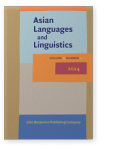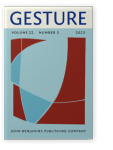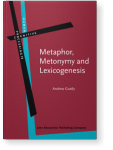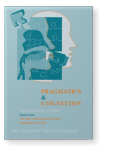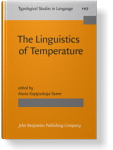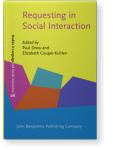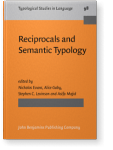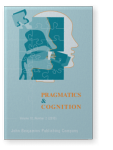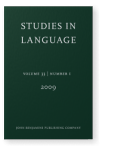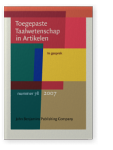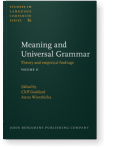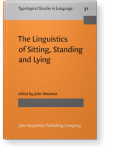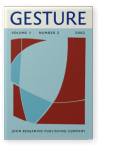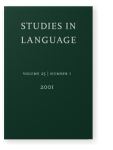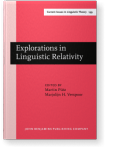N.J. Enfield
List of John Benjamins publications for which N.J. Enfield plays a role.
Journals
Book series
Title
The Body in Description of Emotion: Cross-linguistic studies
Edited by N.J. Enfield and Anna Wierzbicka
Special issue of Pragmatics & Cognition 10:1/2 (2002) vi, 369 pp.
Subjects Cognitive linguistics | Pragmatics | Semantics
2015 Temperature terms in Lao, Southern Zhuang, Southern Pinghua and Cantonese The Linguistics of Temperature, Koptjevskaja-Tamm, Maria (ed.), pp. 594–638 | Article
Lao, Southern Zhuang, Southern Pinghua and Cantonese are four languages spoken in Mainland Southeast Asia. The study of the temperature systems in these four languages – two from the Tai family and two from the Sinitic family – provides an interesting test case for the areal study of temperature… read more
2014 Human agency and the infrastructure for requests Requesting in Social Interaction, Drew, Paul and Elizabeth Couper-Kuhlen (eds.), pp. 35–54 | Article
This chapter discusses some of the elements of human sociality that serve as the social and cognitive infrastructure or preconditions for the use of requests and other kinds of recruitments in interaction. The notion of an agent with goals is a canonical starting point, though importantly agency… read more
2011 7. Description of reciprocal situations in Lao Reciprocals and Semantic Typology, Evans, Nicholas, Alice Gaby, Stephen C. Levinson and Asifa Majid (eds.), pp. 129–148 | Article
This article describes the grammatical resources available to speakers of Lao for describing situations that can be described broadly as ‘reciprocal’. The analysis is based on complementary methods: elicitation by means of non-linguistic stimuli, exploratory consultation with native speakers, and… read more
2010 Review of Streeck (2009): Gesturecraft: The Manu-Facture of Meaning Pragmatics & Cognition 18:2, pp. 465–467 | Review
2009 Review of Aikhenvald & Dixon (2007): Grammars in contact: A cross-linguistic typology Studies in Language 33:1, pp. 241–246 | Review
2007 The Paradox of Being Ordinary In gesprek, pp. 9–23 | Article
This article examines how speakers of Lao (a Southwestern Tai language spoken in Laos, Thailand, and Cambodia) make references to persons in the course of everyday conversation. This seemingly simple referential problem turns out to be a rich locus of meaning in the domain of human social relations. read more
2002 3. Combinatoric Properties of Natural Semantic Metalanguage Expressions in Lao Meaning and Universal Grammar: Theory and empirical findings, Goddard, Cliff and Anna Wierzbicka (eds.), pp. 145–256 | Article
2002 2. Semantics and combinatorics of ‘sit’, ‘stand’, and ‘lie’ in Lao The Linguistics of Sitting, Standing and Lying, Newman, John (ed.), pp. 25–41 | Chapter
2002 ‘Lip-pointing’: A discussion of form and function with reference to data from Laos Gesture 1:2, pp. 185–211 | Article
‘Lip-pointing’ is a widespread but little-documented form of deictic gesture, which may involve not just protruding one or both lips, but also raising the head, sticking out the chin, lifting the eyebrows, among other things. This paper discusses form and function of lip-pointing with reference to… read more
2002 Semantic analysis of body parts in emotion terminology: Avoiding the exoticisms of “obstinate monosemy” and “online extension” The Body in Description of Emotion: Cross-linguistic studies, Enfield, N.J. and Anna Wierzbicka (eds.), pp. 85–106 | Article
Investigation of the emotions entails reference to words and expressions conventionally used for the description of emotion experience. Important methodological issues arise for emotion researchers, and the issues are of similarly central concern in linguistic semantics more generally. I argue… read more
2002 Introduction: The body in description of emotion The Body in Description of Emotion: Cross-linguistic studies, Enfield, N.J. and Anna Wierzbicka (eds.), pp. 1–25 | Article
Anthropologists and linguists have long been aware that the body is explicitly referred to in conventional description of emotion in languages around the world. There is abundant linguistic data showing expression of emotions in terms of their imagined ‘locus’ in the physical body. The most… read more
2000 On linguocentrism Explorations in Linguistic Relativity, Pütz, Martin and Marjolijn H. Verspoor (eds.), pp. 125–158 | Article
Information structure and changes in Moklen word-form Asia-Pacific Language Variation: Online-First Articles | Article
In this study, we investigate an apparent discourse-based alternation between monosyllabic and disyllabic word-forms in Moklen, an Austronesian language spoken in Thailand. We explore whether factors of information structure condition the variable elision of the first syllable of certain… read more
